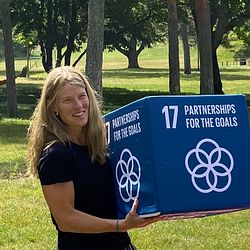Blogginlägg -
What role for local democracy in navigating the Corona pandemic?
Local democracy is being challenged in many ways by the Corona pandemic. Even though motivated by concerns for public safety and health, lock-downs have not been especially democratic, nor have many of the less restrictive demands around mask-wearing and physical distancing. Coordination of both public and private sector responses is by definition a national and international challenge in a pandemic, while allocation of resources to places hardest hit is also a role best suited to a “higher power”. Individual rights have been suspended or weakened. It would seem that getting infected and caring for the infected – and hopefully, leading to recovery – are among the most local of activities.
This raises many questions about the space for local democracy under such conditions:
- Should local decision-making and individual rights be suspended to battle the virus?
- What are the trade-offs in doing so?
- Do the ends (containing the pandemic) justify the means (overriding local democratic institutions)?
- What role can local democracy play to strengthen the effectiveness of pandemic responses?
Mohandas Gandhi is notable as a political actor for seeing means and ends as inseparable.
His philosophy guided peaceful protest and also led to the establishing of the world’s largest democracy. However, Gandhi was part of an impoverished and disempowered populous in a moral battle against an imperial power. This is a quite a different struggle from one against a virus – or is it? The relationship between means and ends is highlighted in efforts to respond to the Corona virus and limit its spread. In some instances, the pandemic has been a pretext for authoritarian power grabs, while in others, authoritarian national leaders have sought to deny the crisis and dodge responsibility for taking action. Governments seen as marginally democratic at best have issued highly restrictive and intrusive top-down mandates that have proven effective in stemming the spread of infection, yet the conflict between means and ends is here not especially obvious.
Harder to find are salient examples of consistency between means and ends that include using democratic principles to guide protection of public health. But if we take Gandhi’s premise and look around the world at efforts to navigate the pandemic, we do we see an interesting example of Gandhi’s philosophy in action. Democratic principles are enshrined in Sweden’s legal framework that governs public health – in Swedish, "Smittskyddslagen" (the infection protection law). Highlighted in a 9 June Op Ed article in Sweden’s major newspaper by Professor Olof Petersson, a political scientist who also led a key democracy investigation that laid part of the groundwork a variety of reforms, this law provides the basis for Sweden’s Covid-19 response. Sweden’s pandemic response has, of course, has been a subject of international attention and much debate both inside and outside of Sweden.
Petersson argues that Sweden’s strategy for combatting the spread of the virus was set not in February, but in 2004 when the legal framework for public health, including combatting infectious disease, was adopted by Sweden’s Parliament.
That framework emphasizes equality and individuals’ right to self-determination, coupled with personal responsibility, replacing an earlier law on public health described as “a more traditional type.” Characterizing the government report that provided the basis for the law, Petersson goes on to say that the humanistic perspective that informed the legislation assumes that individuals can chose between different alternatives based on their own ethical judgements and sense of collective responsibility. But to make such judgements, individual need access to the best knowledge available, which in turn requires public agencies to keep the public as well-informed as possible.
These principles provide the logic behind daily Corona briefings and updates by the Swedish government and key agencies. These briefings have been characterized as more like an academic seminar series than a daily update to inform people about what they can and cannot do. By most accounts, these sessions have been informative, transparent and pedagogical, with a notable level of honesty about uncertainties the extent to which all governments are navigating this crisis with crucial gaps in knowledge needed to respond.
On the question of whether Sweden has charted the right path, or the most effective path, opinions are plentiful – although as we know from other issues, those opinions are not all equally well-informed. It remains far too early to pass judgement about Sweden’s policy choices.
But what we can say is that a response anchored in the democratic principles expressed in Swedish law is an important test that carries with it several thorny challenges.
Is the sense of shared responsibility and the best available knowledge enough to get people to make the “right” decisions? How large is the space that can be characterized as “right,” defined in terms of balancing individual and societal needs?
Part of the nature of democracy is that people have the freedom to make “wrong” decisions – different than what people would choose in retrospect – and that may have unwanted consequences for the individual, community, or society. And regarding the elephant in the room, the economy. The impact of physical distancing, reduced travel and other measures has had devastating effects on the economy as a whole, with some sectors harder hit than others. Here, as with other needs, the task is to navigate between the Scylla of mass infection and the Charybdis of a stalled economy that also carries dire consequences, but shaped and distributed differently. How these are balanced can and should be informed by people with scientific expertise in order to be as cognizant and transparent as possible under the circumstances.
But as the sociologist Max Weber observed over a century ago, it is not science that owns the decision. Such decisions fall to politics, best tailored to local conditions. And as far as we can see, local democracy is the best, if imperfect, way to arrive at those decisions.
Marcus Carson, Research Director, Swedish International Centre for Local Democracy, ICLD

